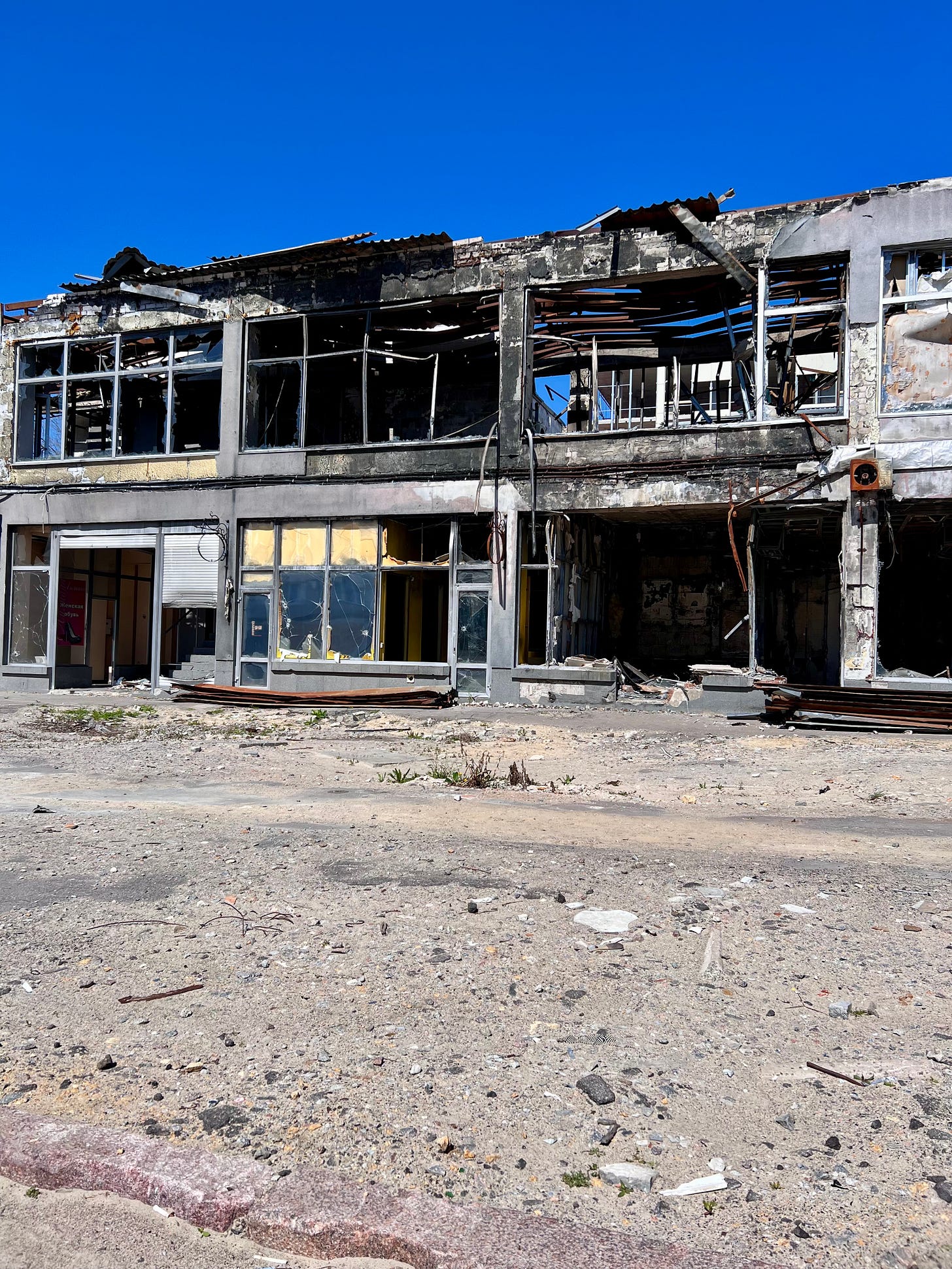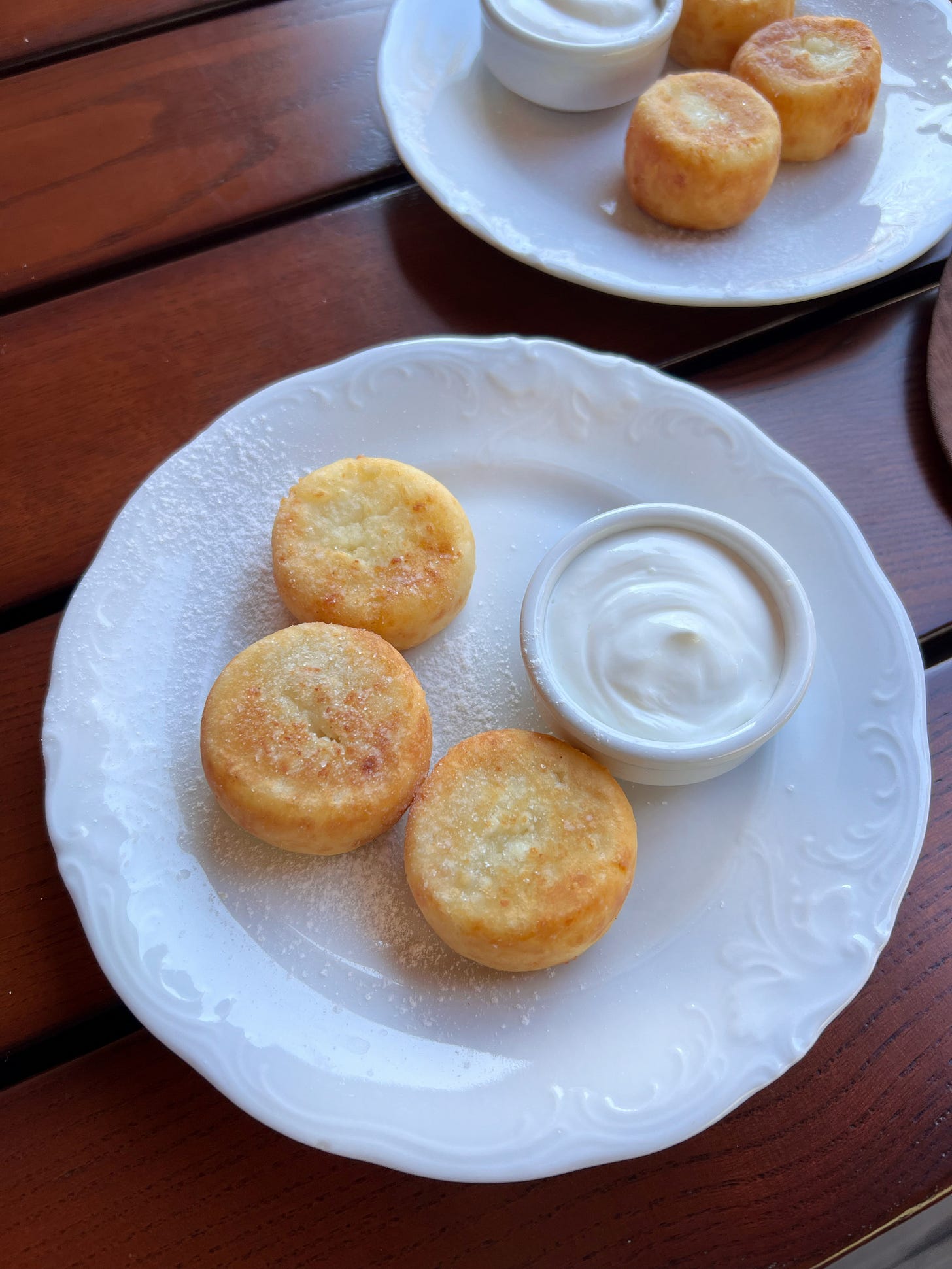Goodbye, Lenin
In a city under constant shelling - there is a restaurant run by a brave man exhausted by worry. He knows the true price of freedom.
This is a photo from Kherson. In the ruins of an elderly couple’s home, which had just been torn apart by a Russian attack, I glanced down at the debris around my feet. There was a burned page from a text book, showing a 1903 picture of Lenin giving a speech. Russian history, quite literally destroying itself.
I've been trying to avoid the slew of articles about the new London restaurant financed by an aristocrat which only opens for a few hours a day, takes bookings by postcard and complains about customers who are not deemed to be spending enough. After all, there's a long tradition of English eccentricity and people are entitled to run a business in whatever way they choose. But this place has portraits of Lenin on the wall and the owner, who claims to be an avowed communist, has praised Vladimir Illyich as a 'liberator of the slaves'. I admit that I had a poster of Lenin up in my room when I was a student, but at least I grew up and moved on. The grim and dreary experience of living in the former USSR got rid of any lingering vestiges of naive romanticism I might have had about the founder of the Soviet state.
I remember the brief, heady moment in Moscow, the summer of 1991 when the huge statues of Lenin and Cheka secret police leader Felix Dzerzhinksy were toppled to the ground. I went to see them, in a park which had been turned into a graveyard filled with the broken symbols of totalitarianism, gesturing hands pointing uselessly to the sky. Of course it didn't last long - and under Vladimir Putin any vague whispers of freedom were crushed as fast as the Lenin and Dzherzhinsky statues were resurrected too.
I am writing this on a day when Russia has sent hundreds of missiles and drones to destroy civilian homes and energy infrastructure across Ukraine. My friends in Odesa have no electricity, water or light. The night in Kyiv was punctuated by loud explosions and fire. Drones killed two people in their house in Mykolaiv, where our bakery is based. Two railway workers died when missiles hit the tracks in Dniepopetrovsk region. "People near breaking point", a friend messaged me this morning.
While in Russia, in the last couple of weeks alone: a 68 year old Moscow doctor was jailed for 5 years over allegedly criticising the Ukraine war, convicted on the word of one person who denounced her. A woman who returned from Ireland to Crimea to look after her dying mother was jailed for spending 20 Euros to help a Ukrainian charity. A ballet dancer from LA is in jail over a $50 donation she made to Razom for Ukraine. A teenage boy arrested when he was just 15 faces five years in jail after he was accused of joining the Freedom of Russia legion, which he denies. A man spent 19 months in a penal colony over an anti-war drawing his young daughter made in school. And the 27 year old Ukrainian journalist, Viktoriia Roshchyna, died in a Moscow prison, more than a year after she disappeared while reporting from occupied Ukraine.
Downtown Kherson
To find a place whose owners are truly welcoming and kind, you might wish to visit Kherson, a brave city under incessant bombardment from that Lenin-loving country which sends glide bombs, artillery, and FPV drones armed with grenades to hunt civilians down.
Earlier this year, I went to visit a restaurateur there, a young man whose eyes were haunted by intense worry and exhaustion. He had put his entire life savings into the place, building it up over more than a decade of hard work. They had bought a sous vide and a fancy grill, and built a shaded outside terrace for people to sit in summer. He was so proud of what they had created and the dishes they had made: they served hundreds of covers a day.
Then came the full scale invasion when Russian soldiers seized control of the city. There was no electricity or water, and he tried to save as much as he could from the rapidly defrosting freezer stores. People spent their time trying to survive - there were too many stories of those who were imprisoned, tortured or simply disappeared. And yes, the occupiers installed a statue of Lenin again in the central square. When the city was finally liberated, he switched his prized coffee machine back on and made free drinks for those who rushed onto the streets to celebrate.
The joy was shortlived, as Russian forces dug in across the river and began shelling Kherson day in, day out. The restaurant stayed open, but at the most there were 10 to 15 customers a day. It was far too dangerous to sit for long on the terrace, even on a bright sunny morning. My translator and I were wearing full body armour the whole time we were in town.
No problem splitting an order here
We sat at a table inside to chat, and I ordered some breakfast, splitting a portion of syrniki with my translator because we were about to go to another place for lunch. Not for a moment would anyone have even thought to complain about us sharing an order: they put three syrniki on each plate with some sour cream and brought it over with our coffee. The restaurateur showed me a video of the night rockets had fallen right outside, the blast wave blowing out the windows, broken glass everywhere. They had cleared it up in the morning, patched up the windows as best they could, and re-opened again. The bill for our breakfast came to a couple of pounds, and I left a tip worth many times more. As for the restaurant - they are just about hanging on - but their courage, kindness and humanity remain intact.
And if you want a primer on what life was really like in the old USSR, you could start with this.
https://united24media.com/anti-fake/seven-myths-about-the-soviet-union-separating-fact-from-fiction-3707





I am heart broken reading your article about Ukraine. That silly English aristocrat is ignorant in Russian history and doesn't understand that Lenin, Trotsky and Stalin, instead of giving Russians freedom, opened Gulag in 1918 and enslaved Russians until now that is why they go with KGB's Putin against their own brothers and sisters- Ukrainian people. And who are not slaves, they suffer in the prisons, as you write in your article or left Russia.
Thankyou Felicity...a sad read befitting the realities of life in a wartorn homeland..your pic from Kherson:- Lenin presiding over rubble, dust and ashes! I find it and indeed the "myths about the Soviet Union" both fitting depictions of what the 'Russkiy Mir' represents.
As for the Aristocrat...money, privilege, power...and a sheltered existence?....An English OligOrch??